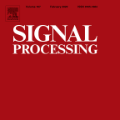Numerous signals in relevant signal processing applications can be modeled as a sum of complex exponentials. Each exponential term entails a particular property of the modeled physical system, and it is possible to define families of signals that are associated with the complex exponentials. In this paper, we formulate a classification problem for this guiding principle and we propose a data processing strategy. In particular, we exploit the information obtained from the analytical model by combining it with data-driven learning techniques. As a result, we obtain a classification strategy that is robust under modeling uncertainties and experimental perturbations. To assess the performance of the new scheme, we test it with experimental data obtained from the scattering response of targets illuminated with an impulse radio ultra-wideband radar.
翻译:相关信号处理应用程序中的众多信号可以模拟为复杂指数的总和。 每个指数术语都包含模型物理系统的特定属性,并且有可能界定与复杂指数相关的信号的类别。在本文件中,我们为这一指导原则提出分类问题,并提议一个数据处理战略。特别是,我们利用从分析模型获得的信息,将其与数据驱动的学习技术结合起来。结果,我们获得了一种在模型的不确定性和实验性扰动下稳健的分类战略。为了评估新办法的性能,我们用通过超广频频雷达发射的目标的分散反应获得的实验数据进行测试。




